Guide to a Fast-Food Worker Career
The latest Bureau of Labor Statistics (BLS) data shows that currently, more than 3,675,000 people work in the fast-food industry across the U.S.
With 789,300 annual projected job openings for this occupation, it is clear that Fast-Food Workers will be in demand for a long time.
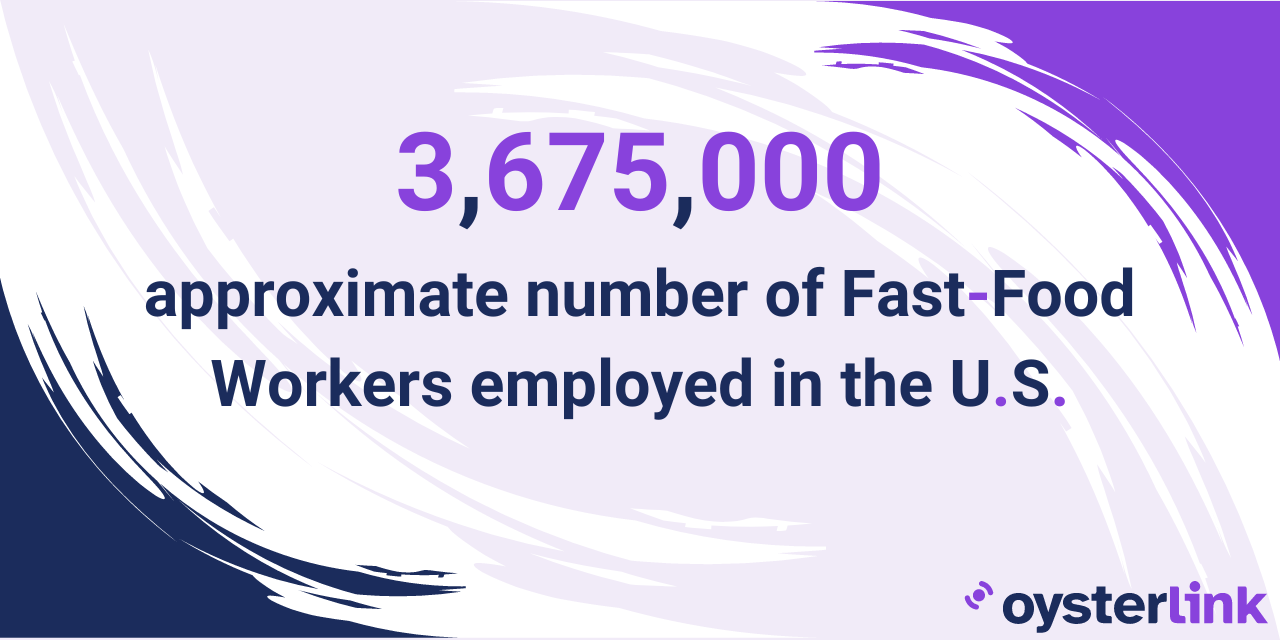
[Source: BLS]
Our guide will give you valuable insights into the Fast-Food Worker role where you will find out what their responsibilities are, how much they are getting paid and more.
What Is a Fast-Food Worker?
A Fast-Food Worker, also called a Crew Member or Food-Service Assistant, is an individual employed in a quick-service restaurant, such as McDonald's or Burger King.
They are responsible for food preparation, customer service and keeping the work area clean.
What Does a Fast-Food Worker Do?
Tasks that typically fall under the Fast-Food Worker job description include:
- Taking orders from customers: Welcoming customers and taking their orders at the counter or through a drive-thru window.
- Preparing food items: Cooking or assembling food items following the established recipes and procedures. These may include grilling burgers, frying chicken and making sandwiches and pizzas.
- Handling customers' payments: Processing transactions, operating cash registers or one of the POS systems.
- Assisting customers: Helping customers with their inquiries and concerns and addressing any complaints with professionalism.
- Adhering to safety protocols and procedures: Wiping down surfaces, washing dishes, emptying trash as well as taking care of personal hygiene (e.g., washing hands and wearing hair nets) to ensure a clean and safe work environment.
- Managing supplies: Keeping track of and restocking food items, kitchenware and other supplies.
- Promoting daily specials: Telling customers what are the promotional offers of a day and recommending additional menu items
Top Skills and Qualities of Fast-Food Workers
To perform well as a Fast-Food Worker, you need to have the following combination of skills and qualities:
- Customer-oriented attitude
- Strong communication skills
- Team player spirit
- Ability to prioritize tasks
- Problem-solving skills
- Knowledge of food safety procedures
- Physical stamina
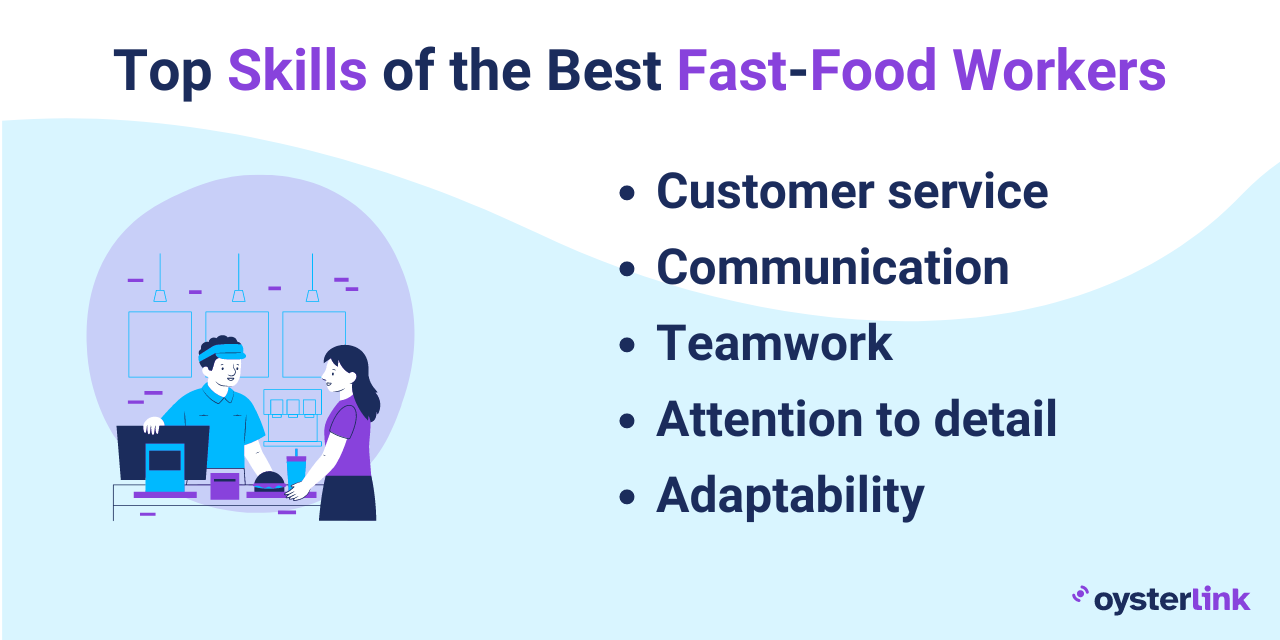
How To Become a Fast-Food Worker
Becoming a Fast-Food Worker typically involves a straightforward process, such as:
- Searching for job openings: Look for job openings at fast-food restaurants in your area or browse our Fast-Food Worker jobs.
- Preparing a resume: Even for entry-level positions, it's a good idea to have a resume prepared. Include any relevant work experience or volunteer work that shows your skills and reliability. If you are lacking experience, try highlighting your strong personal traits and qualities.
- Submitting applications: Apply for positions at fast-food restaurants either online or in person. Follow the instructions provided in the job description and fill out all forms accurately.
- Preparing for the interview process: Once you are selected for an interview, start preparing by researching the company and practicing your answers to some of the common Fast-Food Worker interview questions. During the interview, emphasize your customer service skills, ability to work in a fast-paced environment and willingness to learn.
- Completing training: Once hired, you will likely undergo training provided by the establishment. This training will cover food safety, customer service procedures, operating equipment and company policies.
What Are the Requirements To be a Fast-Food Worker?
To become a Fast-Food Worker, you don't need to fulfill many requirements aside from the age criteria.
Most states have regulations that require teens aged 14 or 15 to obtain a work permit or work certificate to prove they meet the minimum age requirements for employment.
Age restrictions and working hours:
- 14- and 15-year-olds: Most restrictions apply to this age group. In most states, they are not allowed to work during school hours. On school days, they are limited to working a maximum of three hours per day and 18 hours per week.
- 16- and 17-year-olds: They may have more flexibility to work late in the evenings and weekends but it can vary across the individual laws of each state.
- At age 18: Most restrictions are lifted, as 18-year-olds are no longer subject to federal child labor laws.
Teens aged 14 or 15 may be able to perform tasks such as cashiering, table service, bussing tables, cleaning up and limited food preparation and cooking tasks.
However, there are restrictions on certain activities, such as baking, operating certain kitchen equipment, working with open flames, tending bar and serving alcohol.
Teens aged 16 and 17 can typically work as Servers, Hosts/Hostesses, Table Bussers, Cashiers, Food Prep Assistants, Dishwashers, Runners/Expeditors or General Restaurant Assistants, depending on local labor laws and regulations.
Education & Training for Fast-Food Workers
In a survey by the Occupational Information Network (O*NET), 54% of participants stated that Fast-Food Workers typically do not need a high school diploma to perform their job.
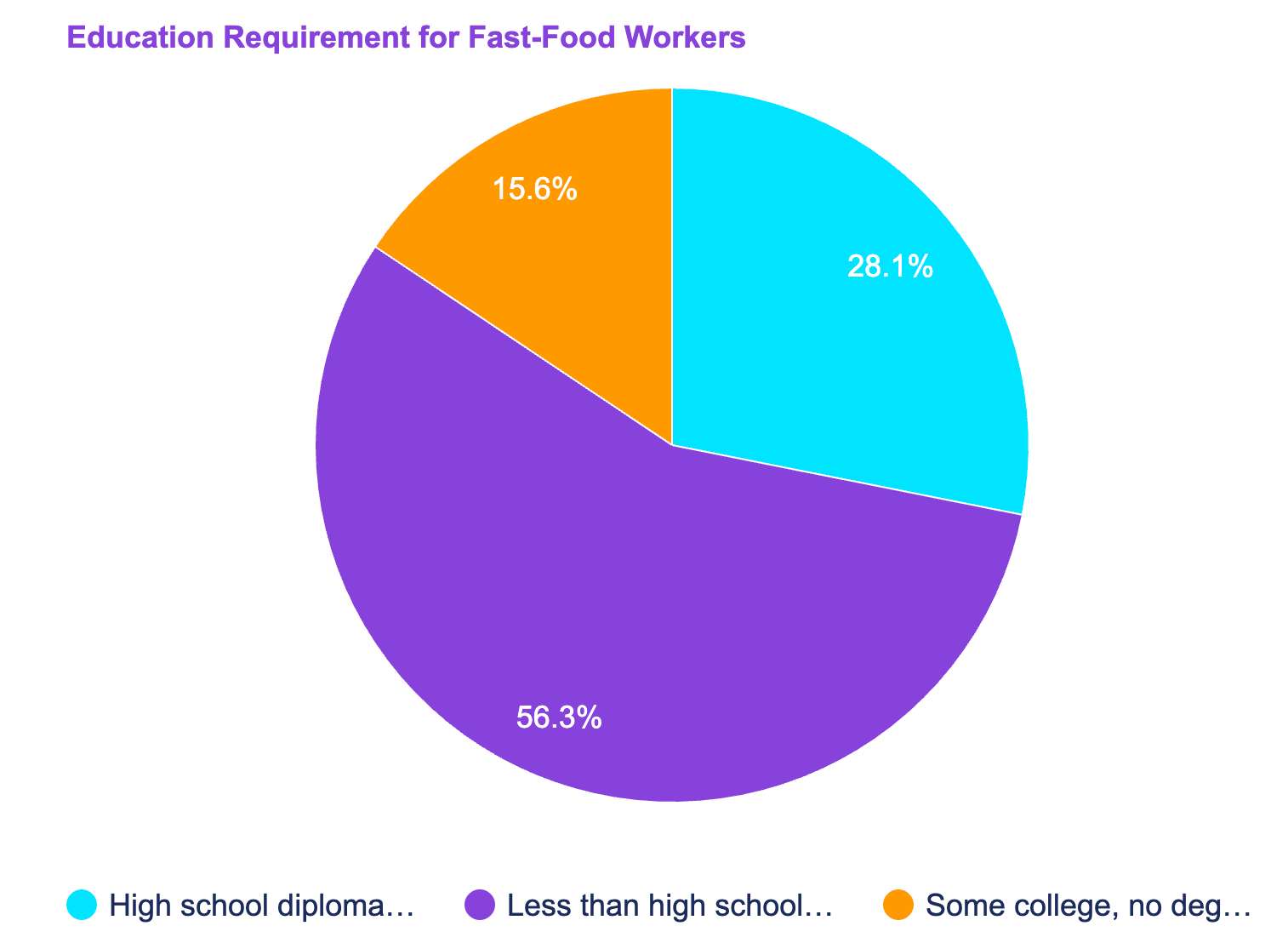
[Source: O*NET]
On-the-job training is common for this position, where workers learn tasks such as food preparation, customer service and operating equipment through hands-on experience.
In some cases, employers may even provide or request additional training in food safety and sanitation best practices.
Fast-Food Worker Wage and Earnings Potential
According to the BLS latest data, Fast-Food Workers in the United States earn an average of $31,110 per year.
Their average hourly wage stands at $14.48 which is almost twice as high as the current federal minimum wage ($7.25).
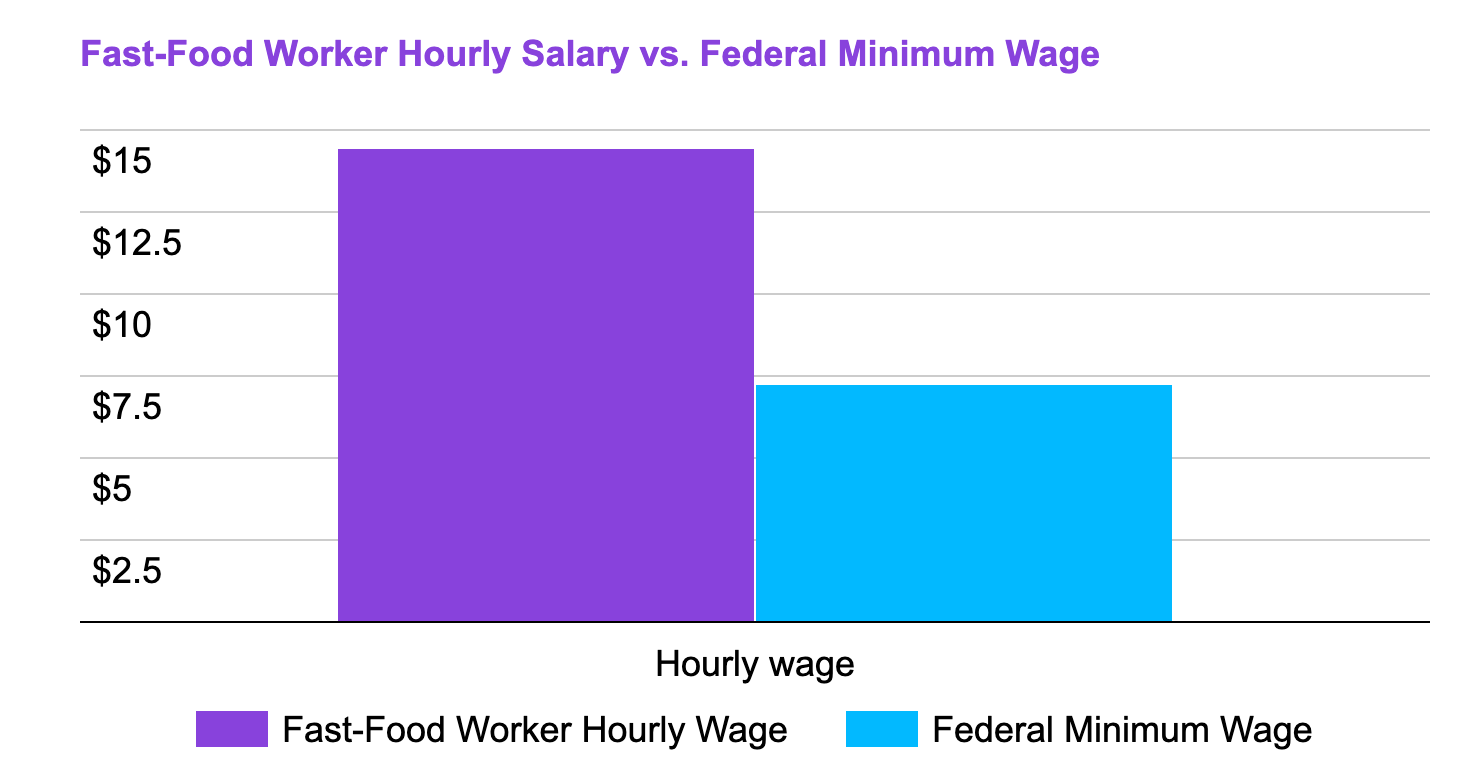
While they typically don't receive tips like sit-down restaurant workers, earning potential ranges from $22,190 to $36,880 per year.
For a more comprehensive take on how much a Fast-Food Worker earns in the U.S., visit our salary career page.
Fast-Food Worker Career Progression
With dedication, experience and hard work, Fast-Food Workers can pave the way to better-paid positions within the industry.
They may advance to some of the kitchen roles, such as Cook or Chef or climb the ladder to managerial positions like Assistant Restaurant Manager or Food Service Manager.
What Is the Workplace of a Fast-Food Worker Like?
According to the BLS, restaurants and other eating places employ the most Fast-Food workers, with 3,060,960 individuals, followed by special food services with 141,760 employees.
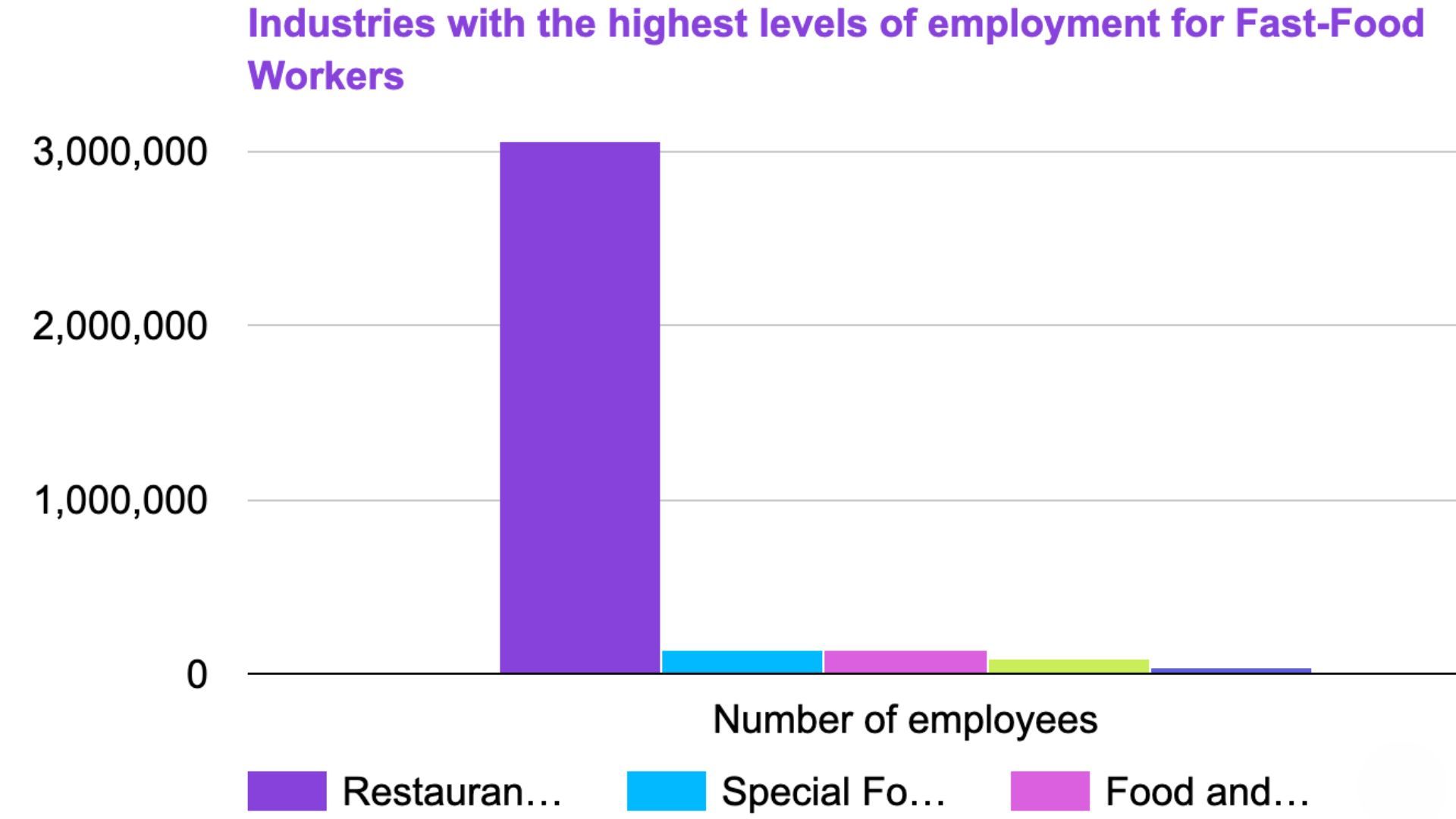
The workplace of a Fast-Food Worker typically involves a fast-paced environment with a focus on efficiency and customer service.
Workers are usually stationed behind counters or in kitchen areas, preparing food, taking orders and handling cash transactions.
They interact with customers regularly, working alongside their team to provide efficient service.
Given the nature of the industry, Fast-Food Workers may work varying shifts, including evenings, weekends and holidays, to accommodate peak dining hours.
Pros and Cons of Being a Fast-Food Worker
The pros and cons of being a Fast-Food Worker can vary depending on your individual preferences and skills, but here's a general overview: Pros:
- Flexible hours: Working in fast-food restaurants often comes with flexible scheduling, making it easier for you to balance your work with other commitments such as school.
- Entry-level opportunities: Fast-food jobs often require little to no previous experience. So, if you are seeking your first employment, quick-service restaurants are the perfect place to start.
- Quick hiring process: Fast-food restaurants in the U.S. typically have high turnover rates, averaging 150% per year. This usually leads to rapid hiring processes and plenty of job opportunities.
- Teamwork and communication skills: Working in a fast-paced environment hones your teamwork and communication skills, which may prove useful when applying to any job following your employment in a fast-food establishment.
- Employee discounts: Some fast-food chains offer employee discounts or free meals as a perk of the job, which helps you save money you would normally spend on a meal.
Cons:
- Low wages: It is not rare for a Fast-food worker to receive minimum wage or only a slightly higher amount. In most cases, this wage will not be enough to cover your living expenses.
- Physical demands: The job can be physically demanding, often requiring you to stand for long periods, lift heavy objects and work in hot or crowded environments.
- Customer service challenges: Dealing with difficult customers or managing high-stress situations can be challenging and emotionally draining.
- Health concerns: Working in fast-food restaurants may involve exposure to heat and long shifts with limited breaks, potentially impacting your physical health.
